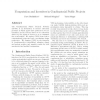Free Online Productivity Tools
i2Speak
i2Symbol
i2OCR
iTex2Img
iWeb2Print
iWeb2Shot
i2Type
iPdf2Split
iPdf2Merge
i2Bopomofo
i2Arabic
i2Style
i2Image
i2PDF
iLatex2Rtf
Sci2ools
105
click to vote
SIGECOM
2010
ACM
2010
ACM
Computation and incentives in combinatorial public projects
The Combinatorial Public Projects Problem s an abstraction of resource allocation problems in which agents have preferences over alternatives, and an outcome that is to be collectively shared by the agents is chosen so as to maximize the social welfare. We explore CPPP from both a computational perspective and a mechanism design perspective. We examine CPPP in the hierarchy of complement-free (subadditive) valuation classes and present positive and negative results for both unrestricted and truthful computation.
Combinatorial Public Projects | ECommerce | Mechanism Design Perspective | Resource Allocation Problems | SIGECOM 2010 |
Related Content
| Added | 18 Jul 2010 |
| Updated | 18 Jul 2010 |
| Type | Conference |
| Year | 2010 |
| Where | SIGECOM |
| Authors | Dave Buchfuhrer, Michael Schapira, Yaron Singer |
Comments (0)

